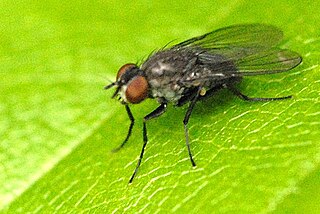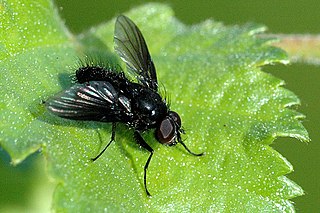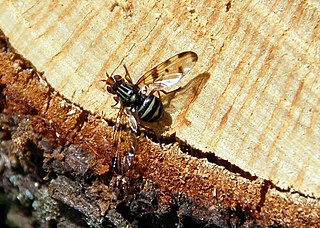
The Ulidiidae or picture-winged flies are a large and diverse cosmopolitan family of flies (Diptera), and as in related families, most species are herbivorous or detritivorous. They are often known as picture-winged flies, along with members of other families in the superfamily Tephritoidea that have patterns of bands or spots on the wings. Some species share with the Tephritidae an unusual elongated posteroapical projection of the anal cell in the wing, but can be differentiated by the smoothly curving subcostal vein. Two species, Tetanops myopaeformis and Euxesta stigmatias, are agricultural pests.

Helina is a very large genus from the fly family Muscidae.
Pegoplata, sometimes known as Nupedia, is a genus of flies within the family Anthomyiidae.

The Scathophagidae are a small family of Muscoidea which are often known as dung flies, although this name is not appropriate except for a few species of the genus Scathophaga which do indeed pass their larval stages in animal dung. The name probably derives from the yellow dung fly, which is one of the most abundant and ubiquitous flies in many parts of the Northern Hemisphere.

Fannia is a very large genus of approximately 288 species of flies. The genus was originally described by the French entomologist Jean-Baptiste Robineau-Desvoidy in 1830. A number of species were formerly placed in the genus Musca.

The genus Scathophaga are small to medium sized predatory flies that for the most part, have larvae that feed on other insect larva within animal dung or decaying vegetable matter. Many are highly variable, sometimes producing small, infertile males that superficially resemble females. This species is an example of an organism which may selectively store the sperm of multiple males, as females have three to four spermathecae.

Phaonia is a very large genus from the fly family Muscidae. It is distributed worldwide, with more than 750 species having been described.

Chironomini is a tribe of midges in the non-biting midge family (Chironomidae).

Coenosia is a very large genus of true flies of the family Muscidae. Coenosia are known as tiger flies since they are predators and hunt many kinds of insects and other invertebrates.

Spilogona is a very large genus of flies from the family Muscidae.

Mydaea is a large genus from the fly family Muscidae.

Dexiini is a tribe of flies in the family Tachinidae.

Otitinae is the name of a subfamily of flies in the family Ulidiidae. It was formerly the Otitidae. Like the Ulidiinae, most species are herbivorous or saprophagous. Most species share with the Tephritidae an unusual elongated projection of the anal cell in the wing, but can be differentiated by the smoothly curving subcostal vein. Most are dull gray to shiny brown or black flies with vein R1 setulose or, in a few cases, bare.

Chaetosa punctipes is a species of fly in the family Scathophagidae. It is found in the Palearctic.

Nanna is a genus of small to medium-sized predatory flies.
Ortalis is an historic genus of Ulidiid or picture-winged flies, first described by Fallén in 1810. It served as the type genus for the family Ulidiidae, which was called Ortalidae at the time. In 1932, it was pointed out by Adlrich that the name Ortalis was preoccupied by a genus of birds which had been named by Merrem in 1786. The name of the fly family was therefore revised, with some authors calling it Otitidae until Ulidiidae was settled on as standard. The genus itself was found to be paraphyletic, and all of its species have been reassigned to other genera, some in the Ulidiidae, and some in other Tephritoid families. In the following list, the species are organized according to the families and genera to which they have been reassigned.

Scathophaginae is a subfamily of dung flies in the family Scathophagidae. There are at least 30 genera and 130 described species in Scathophaginae.

Cordilura is a genus of dung flies in the family Scathophagidae. There are more than 90 described species in Cordilura.

Palloptera is a genus of flutter flies in the family Pallopteridae. There are at least 30 described species in Palloptera.
















